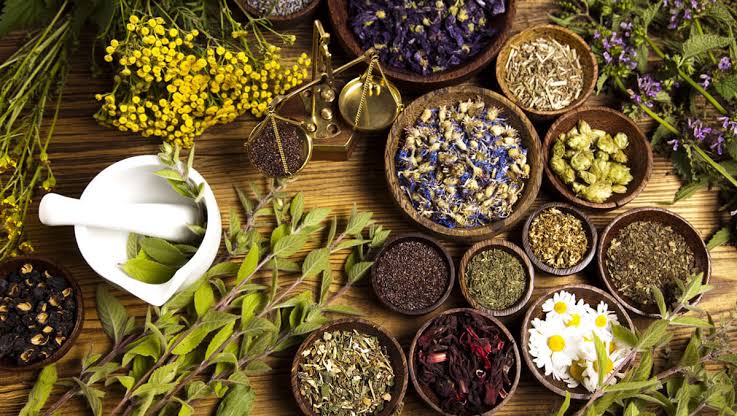The Federal Government on Tuesday, marked the 2024 African Traditional Medicine Day by underscoring its commitment to strengthening the regulation and safety of traditional medicine in Nigeria.
The Minister of State for Health, Dr Tunji Alausa, announced this on Tuesday in Abuja during a briefing with newsmen in commemoration of the 2024 African Traditional Medicine Day.
The World Health Organisation (WHO, African Region) celebrates August 31 each year as Traditional Medicine Day.
It is celebrated in recognition of the enduring significance of African traditional medicine and its integral role in enhancing health and well-being across the continent.
Traditional medicine has been the trusted, acceptable, affordable, and accessible source of healthcare for African populations for centuries.
About 80 percent of the continent’s population relies on traditional medicine for its basic health needs.
The theme for this year’s commemoration is “Support the Provision of Quality and Safe Traditional Medicine through Appropriate Regulatory Mechanisms.”
This reflects ongoing efforts to ensure that traditional practices are safe, effective, and well-regulated.
In his address, Alausa underlined the critical role that traditional medicine plays in the healthcare system, particularly in rural areas where it serves as the primary form of healthcare.
He acknowledged the rich heritage and extensive knowledge embedded in traditional medicine, passed down through generations.
The Minister reiterated the importance of aligning traditional medicine with established standards of quality, safety, and efficacy, a goal that requires robust regulatory frameworks.
He said that the roles of regulatory bodies was integral in enhancing the safety of traditional medicine.
He listed such bodies to include the National Agency for Food and Drug Administration and Control (NAFDAC), the Standards Organisation of Nigeria (SON), and research institutes like the National Institute of Pharmaceutical Research and Development (NIPRD).
“These agencies have been pivotal to setting standards for the production and distribution of traditional medicines, ensuring transparency and accountability in the sector.
“In the past year, NAFDAC has intensified its efforts to regulate the traditional medicine industry.
“These efforts include the inspection of manufacturing facilities, the formulation of guidelines for Good Manufacturing Practices (GMP), and the listing of over 2,000 traditional medicinal products to ensure their safety and efficacy,” he said.
He also detailed several key achievements by the Federal Ministry of Health (FMOH).
He credited the ministry with the development of the Traditional Medicine Policy, the Nigerian Herbal Pharmacopoeia, and the Nigerian Essential Medicinal Plants List, all of which were launched during the event.
Alausa said that the ministry was in the final stages of developing a Code of Ethics and Practice for traditional medicine practitioners.
He said that the ministry would also establish a regulatory body to oversee the practices and facilities of traditional medicine practitioners.
Looking ahead, he reaffirmed the government’s commitment to bolstering the economy through the Renewed Hope agenda, which prioritises Universal Health Coverage.
“This initiative aligns with the Nigeria Health Sector Renewal Investment Initiative.
“It seeks to improve local research funding for new drugs and vaccines, with a particular focus on traditional medicine,” he said.
He called for continued collaboration among the government, practitioners, and all stakeholders to create a healthcare system that honoured traditional practices while ensuring their quality, safety, and efficacy.
The Permanent Secretary of the Federal Ministry of Health, Ms Daju Kachollom, highlighted the integration and promotion of traditional medicine within national healthcare systems in Africa.
Kachollom stressed it’s importance in achieving health for all and underscored the need to accelerate its development to support healthcare across the continent.
She also underscored the importance of recognising and celebrating the cultural heritage and diversity of the medicine in Africa.
The Director-General of NAFDAC, Prof. Moji Adeyeye reaffirmed the agency’s commitment to public safety and trust.
Adeyeye, represented by a Deputy Director in NAFDAC, Ezeaka Ijeoma, said that the agency’s top priority was ensuring the safety and well-being of the public.
“Every regulation, every control measure, and every certification process we implement is designed with the consumer in mind.
“We want to assure you that the products we regulate are safe for use and consumption,” she said.
She said that the agency was embracing cutting-edge technologies to enhance its operations.
“These advancements are not just about improving efficiency; they are about enhancing our ability to protect public health.
“By integrating these technologies, we ensure that our processes are more transparent, more reliable, and more secure,” she said.
She also affirmed NAFDAC’s commitment to meeting and exceeding international standards, noting that the agency’s labs are IC-certified and recognised globally by organisations such as WHO.
“We are not resting on our laurels. Our journey towards excellence is ongoing. We are continually updating our regulations and processes to adapt to new challenges and innovations.
“This commitment to continuous improvement is what keeps NAFDAC at the forefront of public health protection,” she said.
Earlier, a former Director of the Traditional Medicine Departmen, FMOH, Zaniab Shariff, while speaking on the sidelines of the event said that the medicine had been the backbone of African health systems for centuries.
Shatiff noted that well-catered-to and standardised medicine had immense potential to provide adequate healthcare services to the largest number of Nigerians, particularly at the primary healthcare level.
The event culminated in the presentation of the second edition of the Traditional Medicine Policy for Nigeria and the first-ever Nigerian Essential Medicinal Plants List.
This marks a significant milestone in the nation’s healthcare system.
The event also served as a platform for discussing the development of Indigenous herbal plants among policymakers.


